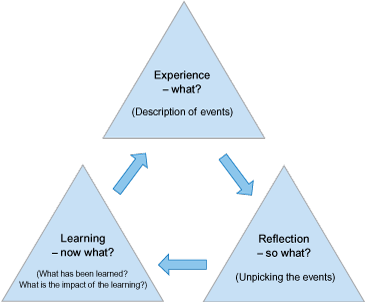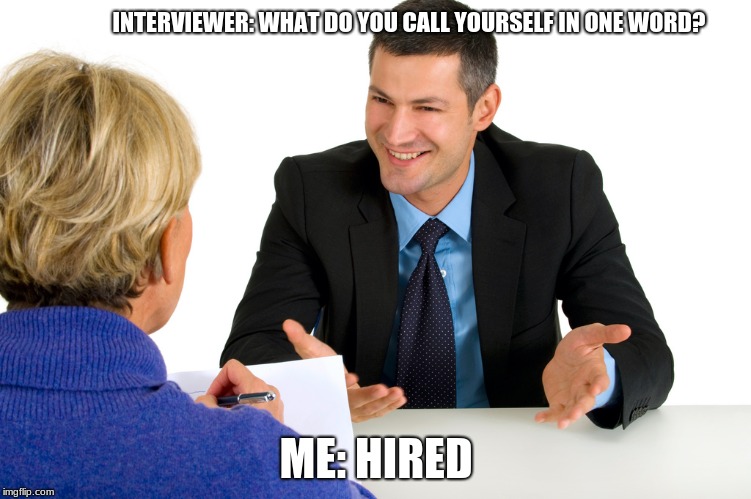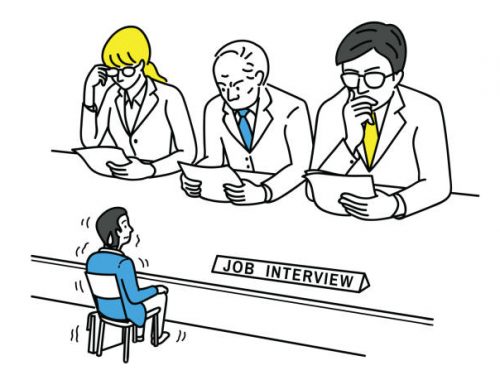Simulated Hell
Job interviews, everyone will have to do them at some point in their life, some are better at them than others, but all dread them. Recently as part of my Work-Based module I had a simulated job interview to help me practice and learn the skills needed for this necessary evil in life. In this blog I will review this experience using the Boud et al’s Model of self-reflection to assess my successes and potential places to improve.
The Hot Seat

To begin with I had to find a job I would be interested in applying for in the future, looking online I found a job as a Media Coordinator for the BBC. This entailed helping run many social media accounts for CBBC, interacting and engaging with their audience. So, after sending this off to my group for them to devise mock questions for me I did the same, looking over the job description and required skills, highlighting key words they used and what I would say for standard questions they could ask. Then the day of judgement came. ‘To gain the upper hand, get to the meeting place early’ (Yate, P 228) which I did and was as well dressed as my wardrobe would allow. The interview itself lasted for 10 minutes, at the beginning of which I realised I was answering the questions very quickly. I took a moment to collect myself, making myself relax and talk slower, as well as ensuring I had very open and confident body language, speaking clearly and loudly. After 10 minutes in the hot seat the hell was over, the interviewers submitted feedback of my performance for me to review and I could relax again.
The Back Seat
So, taking a back seat and reviewing the whole experience let’s see what I could have done better and what went well. So, a good place to start is my feedback, ‘The candidate was well prepared’, ‘Provided a lot of relevant detail, seemed well-versed in the job and also the company’. So, as my Work-Based module has taught me the interview begins long before you sit down with the employers, the job description often contains wording and phrases that the interviewer will be looking out for. ‘Study the information pack before you go. This will enable you to ask some relevant questions, giving the impression of someone who is well-informed’ (Ellis, P 37), this shows you are interested in the role and engaged with the application which the feedback shows I did well.

Another important part of the interview process to remember is they are interviewing you as a person, as well as your skills and abilities, ‘It is important that you turn up looking smart and clean’ (Ellis, P 101). Some other feedback I got is in regards to this, ‘They presented very well, had a good use of language, had good eye contact and body language and were confident in their answers’, ‘The candidate appeared confident and professional’. Your self-presentation and confidence can go a long way to have you stick in the mind of an interviewer, which I seem to have done by these feedback comments, even through small things like eye contact and open body language.
A useful technique I used in the interview, that I learnt from my course was the Star Technique, which was mentioned in my feedback, ‘They used the star technique very well and was able to provide situations and resolutions to the problems that was able to relate back to the question’. It is a system designed to help you tell a story without getting off track and rambling, while also emphasising the skills displayed in the story you are highlighting. This meant I could effectively relate my past experiences to the skills needed for this job as this feedback states, ‘They reflected well and related their skills and experience to the role very well, and they had experience which matched the job role very well’. Overall it seems that the interview was highly successful and I would have gotten the job if it wasn’t a mock one.

The Seat-Of-My-Pants
So, looking back over the experience what have I learnt? Good preparation is key, turning up and hoping they hire you because they liked your CV isn’t enough. Even just small things as we have seen from my feedback like talking confidently and referencing the skills requested in the job description go a long way. However not all of my feedback was positive unfortunately, ‘The candidate said they don’t do too much in their spare time, I think this should have been answered differently, including some relevant hobbies’. My hobbies and interests aren’t the most engaging or intriguing subjects, which isn’t great for an interview setting. One thing I definitely need to work on is ways of relating skills of my hobbies to the potential jobs and field I will be applying to in the future.
References
https://imgflip.com/i/27mc33– Accessed 23/02/2022
https://www.open.edu/openlearn/mod/oucontent/view.php?id=51386§ion=4– Accessed 23/02/2022
https://www.rightattitudes.com/2008/07/15/star-technique-answer-interview-questions/– Accessed 23/02/2022
Bibliography
Angus Finney. et al. Chao Yue Hao Lai Wu:Du Li Dian Ying Shang Ye Yun Zuo Zhi Nan. Zhong Guo Dian Ying Chu Ban She, 2015.
Bloore, Peter. The Screenplay Business. Routledge, 2013.
Chivers, Barbara, and Michael Shoolbred. A Student’s Guide To Presentations. SAGE Publications Ltd, 2014.
Clarke, John. The Right Way To Write Your Own CV. Right Way, 2001
Corfield, R. (1999) Preparing your own CV: how to improve your chances of getting the job you want
Dawes, Graham, and Ian Cunningham. The Handbook Of Work-Based Learning. Gower Publishing Limited, 2004.
Done, Judith. Brilliant Graduate Career Handbook. Pearson, 2016.
Ellis, R. T. Interview Skills: From Both Sides Of The Fence. Creatspace Independent Publishing Platform, 2015. p. 101
Fanthome, Christine. Work Placements – A Survival Guide For Students. Macmillan Education, Limited, 2004.
Gregory, Georgina et al. Careers In Media And Film. SAGE Publications Ltd, 2014.
Herbert, Ian, and Andrew Rothwell. Managing Your Placement: A Skills-Based Approach. Palgrave Macmillan, 2005.
Jones, Alan. How To Write A Winning CV: A Simple Step-By-Step Guide To Creating The Perfect CV. Century, 1996,
Rogers, Howard. Writing Your C.V: Conducting A Successful Interview. Easyway Guides, 1997.
Rook, Steve. The Graduate Career Guidebook. Red Glode Press, 2019.
Rosenthal, Alan. Succeeding As A Documentary Filmmaker. Southern Illinois University Press, 2011.
Spicer, Andrew et al. Beyond The Bottom Line. London: Bloomsbury, 2014.
Yate, Martin John. Great Answers To Tough Interview Questions. Kogan Page, 2014. p. 228
NO PAIN - BUT A LITTLE GAIN
You May Also Like

Simulated Interviews: A Pointless Exercise?
14 February 2022
Simulated Interrogation
18 February 2022
